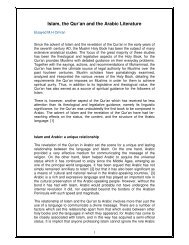ِDownload
ِDownload
ِDownload
Create successful ePaper yourself
Turn your PDF publications into a flip-book with our unique Google optimized e-Paper software.
3-<br />
The more we rise up from the surface of the earth, the more the air<br />
pressure decreases, thus leading to decrease of the rate of air passage<br />
through alveoli pulmonis to blood. Decrease of air pressure also leads to<br />
distention of gases in stomach and intestines that push the diaphragm<br />
upwards, thus pressing over and obstructing the extension of lungs.<br />
Stages of the symptoms of oxygen shortage phenomena:<br />
These are divided into four stages that relate to air pressure and the level of<br />
altitude and the rate of oxygen concentration in blood.<br />
1- The stage of non alteration, i.e., from the level of sea to an altitude of 3 km.<br />
In this stage, the symptoms of oxygen shortage are not present and sight is not<br />
affected at day time.<br />
2- The stage of physiological adjustment, i.e., from an altitude of 3 km to 5<br />
km. Body systems function in this stage in such a way that will not let the<br />
symptoms of oxygen shortage appear, unless the period of exposing to such a<br />
shortage is elongated, or the person exerts physical effort in such conditions. In<br />
that case, rates of respiration, pulse, blood pressure and circulation increase in<br />
number and depth.<br />
3- The stage of physiological disturbance, i.e., from an altitude of 5 km to 8<br />
km. In this stage, body systems, particularly the lungs, cannot afford to function<br />
properly or supply the quantity of oxygen needed by tissue sufficiently. Hence<br />
the symptoms of oxygen shortage appear. In this stage, a clear explanation is<br />
established for man’s feeling of exhaustion, headache, feeling like to sleep,<br />
dyspnea and chest tightness when rising up in high altitudes. As a result of air<br />
pressure decrease, all air comes out of lungs and alveoli pulmonis, reducing the<br />
size of lungs and chest (i.e., the chest becomes really tight).<br />
4- The stage of chest tightness, i.e., from an altitude of 8 km upwards. In this<br />
stage, man loses consciousness totally due to the failure of the nervous<br />
system, and condition becomes critical.<br />
The higher the man climbs up in sky the less is the oxygen<br />
The Quran which was revealed fourteen centuries ago to Prophet Mohammed<br />
(PBUH) states: “Whomsoever Allah desires to guide, He expands his chest to




